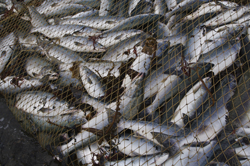Breeding virus out of salmon stocks
Aquaculture is one answer to overfishing dwindling stocks and meeting the demand for fresh fish. As usual, there is a price to pay. An overcrowded pool of only one fish species is the dream of an infecting microbe. Once stock becomes infected, huge losses may occur. Disease prevention has therefore become priority for the fish farming industry. In the case of pancreas disease (PD), there is a vaccine. This, combined with careful stock management can be effective against infection. Perhaps a more sustainable option is the development of resistant strains of salmon. No susceptibility to the disease means viral infection would be impossible. With funding from the EU, the Spd/sd diagnosis project investigated this possibility by looking at different susceptibilities of wild salmon smolt to pancreas disease (PD). The scientists devised a series of trials to monitor the extent of effects of PD on the fish. Three different strains of Atlantic salmon smolt were infected with the virus. Each fish type had its own seawater tank. Pancreas disease affects not only the pancreas but the heart and skeletal muscles. To assess damage, samples of affected tissues were scored for viral lesions over a total period of 42 days. Another approach involved assessing the actual amount of virus present in fish serum. For this, a so-called end-point virus neutralisation was carried out. This gives a very accurate picture as the serum samples are diluted until no positive result for the presence of virus is detected. The results give a positive boost to the argument for breeding resistant fish. This appeared to be particularly true at the smolt stage when the fish make the transition from fresh to seawater. As more research is required into the mechanisms behind resistance to the virus, a future research schedule was planned involving specialist smolt producers. Identification of the genes and proteins involved can be important in management of future breeding programmes. Pancreas disease can cause significant losses due to morbidity, mortality and reduced production. Stocking fish farms with resistant strains of salmon would seem to be a viable solution.







